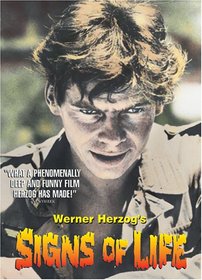| Actors: Peter Brogle, Wolfgang Reichmann, Athina Zacharopoulou, Wolfgang von Ungern-Sternberg, Wolfgang Stumpf Director: Werner Herzog Creators: Thomas Mauch, Stavros Xarchakos Genres: Indie & Art House, Drama, Military & War Sub-Genres: Indie & Art House, Drama, Military & War Studio: New Yorker Video Format: DVD - Black and White - Closed-captioned DVD Release Date: 07/05/2005 Release Year: 2005 Run Time: 1hr 31min Screens: Black and White Number of Discs: 1 SwapaDVD Credits: 1 Total Copies: 0 Members Wishing: 9 MPAA Rating: Unrated Languages: German, Greek Subtitles: English |
Search - Signs of Life on DVD
  | Signs of Life Actors: Peter Brogle, Wolfgang Reichmann, Athina Zacharopoulou, Wolfgang von Ungern-Sternberg, Wolfgang Stumpf Director: Werner Herzog Genres: Indie & Art House, Drama, Military & War UR 2005 1hr 31min "Stroszek is an injured soldier sent to recuperate at a remote Greek island. There, he and his new Greek wife, Nora, serve as caretakers to an abandoned ammunition dump. The newlyweds adjust to their new life on this encha... more » |
Larger Image |
Movie DetailsSimilar Movies
|
Movie ReviewsGood film; problematic DVD Tryavna | North Carolina | 08/27/2005 (3 out of 5 stars) "First off, I want to say that I'm a big fan of Werner Herzog. Between 1972 and 1982, he was one of the best directors in the world, coming up with such unique masterpieces as "Aguirre," "Kaspar Hauser" (or whichever title you prefer), "Nosferatu" (the remake), and "Fitzcarraldo." As his feature-length debut, "Signs of Life" never quite reaches the sublime heights of those later movies. For one thing, I find the narration a little clunky, as if Herzog were still clinging to the last vestiges of traditional plot development, and lead actor Peter Brogle lacks the electrifying presence that Bruno S. and Klaus Kinski bring to Herzog's later films. Still, this film points the way to Herzog's later masterpieces, and it undeniably possesses the same eerie atmosphere and languorous beauty that we associate with his movies. I'll also single out Wolfgang Reichmann's performance as Meinhard as being particularly good. All in all, I give this film 4 stars, but I recommend that movie buffs new to the world of Herzog start with his collaborations with Kinski (which are available in a nice boxset from Anchor Bay) and then work backwards to "Signs of Life." I've deducted one star from my rating, however, because of New Yorker Video's rather problematic DVD. On the surface, it's a very appealing release: the print they used is beautiful and nearly flawless, and they include a director's commentary with Herzog himself, who is always interesting to listen to. But for some reason, New Yorker has NOT given this film a progressive transfer -- in other words, instead of capturing each individual frame of the film (24 per second), they've simply transferred it all at once (rather like a videotape). To be honest, it's about as good a non-progressive transfer as you can get, and people with regular tube TVs probably won't notice any problems. But for those with projectors and high-resolution screens (heck, even if you toss it into your PC and watch it on your monitor!), you're going to notice a blurriness during horizontal movement that people call "combing." In my opinion, non-progressive transfers are simply unacceptable in 2005, especially since many of us will soon be upgrading to higher resolution TVs. I simply don't understand why New Yorker continue to go the non-progressive route, but I'm pretty sure this will be the last New Yorker DVD I buy until they get their act together. Finally, I also wish that this DVD had included the two short films that Herzog mentions in his commentary as tying in thematically or stylistically with "Signs of Life": "Last Words" and "The Unprecedented Defence of the Fortress Deutschkreuz." I haven't seen either, but based on the commentary, they sound relevant. Along with the non-progressive transfer, their absence represent exactly why companies like New Yorker fall so short of the standards set by Criterion, despite making such interesting and worthwhile films available." One of Werner Herzog's Best Films youngvelvet | Calgary, Canada | 07/30/2003 (5 out of 5 stars) "Signs of Life is Werner Herzog's very first feature film and also one of his best. The script may have even inspired Stephen King's novel The Shining. In Signs of Life we have an injured soldier and his wife working as the caretakers of a military fortress on a Greek island. The soldier eventually goes mad with boredom and tries to kill his wife and everyone else. Werner Herzog wrote the script himself in 1964 and made the film in 1967 with only $20,000 at age twenty-five. Herzog's script is amazing and the actors all perform flawlessly. Signs of Life has Herzog's distinctive slow pace which may seem like torture to the average viewer who's been forced-fed a steady diet of fast food images. This masterpiece has great photography and a great use of original Greek music. This film reminds me of Roman Polanski's first feature film Knife in the Water (1962). ..." One of Herzog's Best!! John Q. Rowland | Portland, OR United States | 05/19/2003 (5 out of 5 stars) "This is an unbelievably beautiful and poetic film! Great music and cinematography, and a fascinating meditation on the human condition. A wonderful debut by Herzog, an absolute must for fans! In my opinion this is among his best, along with Aguirre, Fitzcarraldo, and Kaspar Hauser. A DVD release of this is desparately needed!" Herzog's first film Jmark2001 | Florida | 09/12/2001 (4 out of 5 stars) "If you like Herzog, do not miss this one. Herzog's usual leisurely pace is meant to draw you in before he unleashes the film. I love Herzog because he is so different from our Hollywood directors. He seems unconcerned with any commercial success and had an original outlook on life in his films."
|






